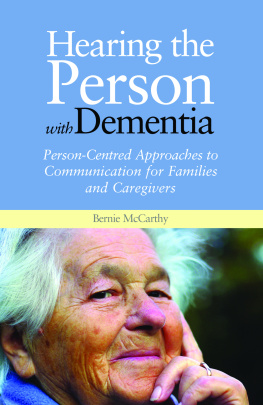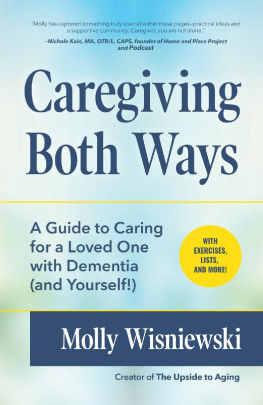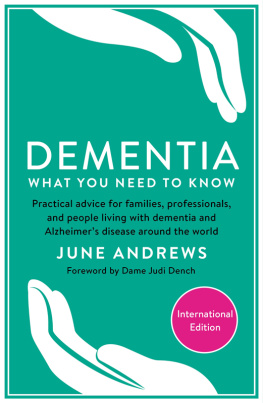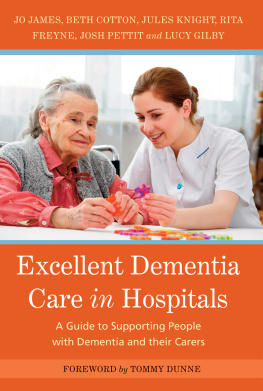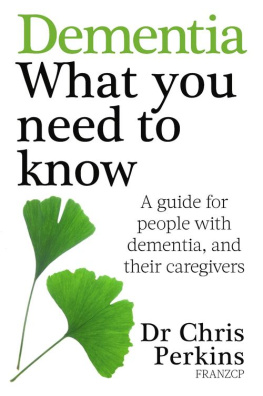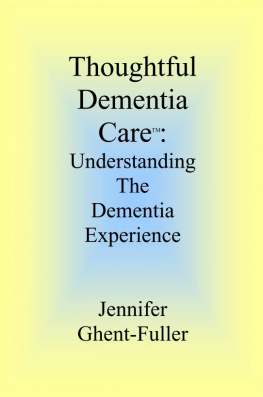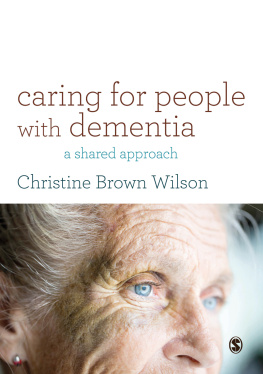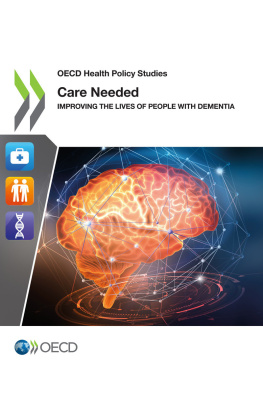Making Tough Decisions about End-of-Life Care in Dementia
A 36-Hour Day Book
Making Tough Decisions about End-of-Life Care in Dementia
Anne Kenny, MD

This book is not meant to substitute for medical, legal, or other professional care of people with dementia, and treatment should not be based solely on its contents. Instead, treatment must be developed in a dialogue between the individual and his or her physician. This book has been written to help with that dialogue.
2018 Anne Kenny
All rights reserved. Published 2018
Printed in the United States of America on acid-free paper
9 8 7 6 5 4 3 2 1
Johns Hopkins University Press
2715 North Charles Street
Baltimore, Maryland 21218-4363
www.press.jhu.edu
Library of Congress Cataloging-in-Publication Data
Names: Kenny, Anne, 1959 author.
Title: Making tough decisions about end-of-life care in dementia / Anne Kenny.
Description: Baltimore : Johns Hopkins University Press, 2018. | Series: A 36-hour day book | Includes bibliographical references and index.
Identifiers: LCCN 2018004456| ISBN 9781421426662 (hardcover : alk. paper) | ISBN 1421426668 (hardcover : alk. paper) | ISBN 9781421426679 (paperback : alk. paper) | ISBN 1421426676 (paperback : alk. paper) | ISBN 9781421426686 (electronic) | ISBN 1421426684 (electronic)
Subjects: | MESH: Terminal Carestandards | Dementia | Caregiverspsychology | Decision Making | Suicide, Assisted | Aged | Personal Narratives
Classification: LCC RC521 | NLM WM 220 | DDC 616.8/31029dc23
LC record available at https://lccn.loc.gov/2018004456
A catalog record for this book is available from the British Library.
Special discounts are available for bulk purchases of this book. For more information, please contact Special Sales at 410-516-6936 or .
Johns Hopkins University Press uses environmentally friendly book materials, including recycled text paper that is composed of at least 30 percent post-consumer waste, whenever possible.
To Mom who taught us so much as she lived well and died from dementia
Preface
This book is laid out as a guidebook. Nearly 500,000 individuals are diagnosed with dementia every year. Year after year. As stunning as that figure is, it does not take into account the family members and caregivers who are subsequently affected by each diagnosis. When they are included, the numbers rise to an even more incredible level.
What this means in our society is a rapidly ballooning population of people faced with painful scenarios and the need to make vital end-of-life decisions for those who no longer cana role for which most are largely unprepared. Sadness, confusion, guilt, anger, and physical and mental exhaustion become the norm for these families as the disease enters its final stage. The toughest decisions I ever made were about the life and death of my mother, who had lost her voice in decisions to dementia. But, I was one of the lucky ones. My 25 years as a doctor specializing in the care of older people and end-of-life care had prepared me to face these decisions. Yet, even with that advantage, I struggled. The challenges that dementia and end-of-life decisions present usually are overwhelming. My personal experience compelled me to fuse my clinical knowledge with everything I learned helping to care for my mother into a book to help others.
This book is a guide focused on care and decisions in the final stages of dementia. Specifically, it is meant to help you deal with inevitable end-of-life problems, such as pain and difficulties with eating, and show you how to navigate the difficult decision-making challenges and communication needs among caregivers and health care providers in the final stages.
The guide may be read as a whole, to give you a landscape for what types of decisions and issues surrounding care and communication may arise along the journey with dementia. Also, if you have questions about care issues specific to the end stage of dementia, you can review the relevant chapter. For example, many families want to know more about what happens in the final weeks or days of life to prepare themselves or other family membersthis can be found in .
Each chapter includes stories of families Ive met and worked with during the past 30 years. These stories are meant to illustrate a common issue, concern, or situation that occurs in late-stage dementia. I hope that by seeing how others have met these challenges, you will see a way to go forward also.
The names of all the people involved have been changed. Identifying characteristics such as ages, genders, ethnicities, professions, familial relationships, medical situations, and social situations have been changed to protect the identities of those involved. At times, a composite of a few people or families was created to illustrate a point. Any resemblance to persons living or dead resulting from these changes is coincidental and unintentional.
Acknowledgments
There are so many people to thank for making this book possible. I am grateful for all Ive learned from all of them in the process of writing it.
First, I would like to thank my mother, my siblings (Hugh, Marilyn, Crazy Dog, Mary Fran, Jack, Donna, Joe, and Connie), and their children and my immediate family (Mark, Conor, Ned, and Becky) for making our personal journey with Alzheimer disease enlightening, rewarding, and rich. The joy and sorrow of living the journey with you transformed my life. My mother had an amazing spirit and passed it down to her childrenwe are lucky. My immediate family was always there with a meal, a hug, patience, laughs, companionship, and love to me and my mother during the years preceding her death. There are no words to thank you all.
Next, this book would not be possible without the generous patients and families that allowed me to enter their lives, to witness their adaptability in the face of a relentless disease. Ive been changed by knowing all of you and am grateful.
I would like to thank Jacqueline Wehmueller, a former acquisitions editor for Johns Hopkins University Press, who first encouraged the kernel of an idea; that encouragement was vital to taking the first step. And then further thanks to Susan Aiello, DVM, who helped to water and prune the plant until there was a completed book; she was always ready with a kind word, a gentle nudge, cheer, and a strong rewrite. Julie Silver, MD, hosted an amazing writing conference that provided the framework to move the idea to a book. Martha Murphy provided early coaching to develop a book proposal.
Thank you to the University of Connecticut SISters writing group (Julie, Noreen, Liisa, and Lisa) for weekly accountability and encouragement. A particular thanks to Noreen for assistance and resources that made a physician writing on legal aspects of end of life less daunting. Thanks also to Barbara and Terran at Farmington River Financial Group for assistance and guidance in drafting the financial aspects of the book. The PalGals (Cassandra, Katy, and Patty) taught me so much about caring and compassion at the end of life. Theresa kept me sane and mindful. Denise, Pam, Annmarie, Chris, Kelly, and Catherine provided just the right amount of cheerleading to keep me going. Finally, love and thanks to ALK for reading, clarification, suggestions, daily walks, drying tears, and continuous encouragement, love, and supportI couldnt have done it without you.
Making Tough Decisions about End-of-Life Care in Dementia
Next page

